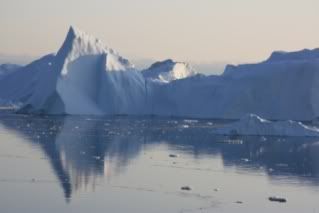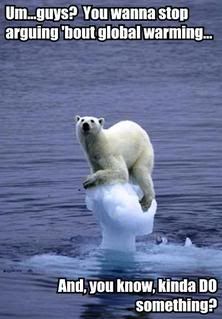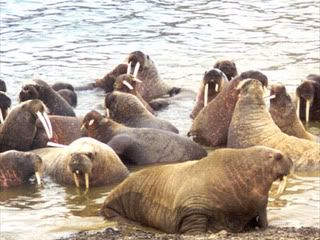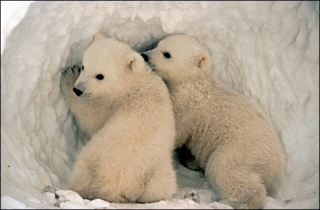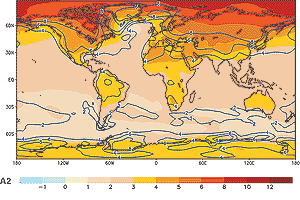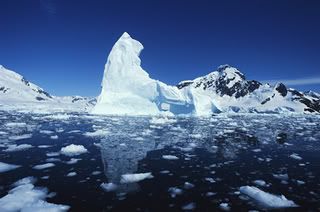Don't buy a house near the beach. Buy the one on the hill, it will be beachfront property in a few years...
California's interagency Climate Action Team on Wednesday issued the first of 40 reports on impacts and adaptation, outlining what the state's residents must do to deal with the floods, erosion and other effects expected from rising sea levels.
Hundreds of thousands of people and billions of dollars of Golden State infrastructure and property would be at risk if ocean levels rose 55 inches by the end of the century, as computer models suggest, according to the report.
The group floated several radical proposals: limit coastal development in areas at risk from sea rise; consider phased abandonment of certain areas; halt federally subsidized insurance for property likely to be inundated; and require coastal structures to be built to adapt to climate change.
"Immediate action is needed," said Linda Adams, secretary for environmental protection. "It will cost significantly less to combat climate change than it will to maintain a business-as-usual approach."
From the same article,
maps showing what will go underwater...
Because the Arctic ice cap is melting:
(CNN) -- It could be the ultimate test of human endurance: Three British explorers are risking their lives in subzero temperatures to measure the melting Arctic ice cap.
The team is on a three-month, 621-mile (1,000-kilometer) hike to their final destination at the North Pole. Along the way, taking precise measurements to determine exactly how fast the ice cap is disappearing.
[snip]
The unique expedition was prompted by this chilling prospect: The Arctic ice cap is melting at an unprecedented rate, which may lead to a dramatic shift in average global temperatures.
"In 2007, sea ice loss was the worst in recorded history," said oceanographer Kate Moran, professor of oceanography and ocean engineering at the University of Rhode Island.
The last time that scientists can say confidently that the Arctic was free of summertime ice was 125,000 years ago, according to the Web site of the National Snow and Ice Data Center in Boulder, Colorado.
All that could vanish within our lifetime, warn climate scientists, who predict that the Arctic sea ice in the summer season could be gone between 2013 and 2040.
Include Greenland and the Antarctic in that:
Scientists will warn this week that rising sea levels, triggered by global warming, pose a far greater danger to the planet than previously estimated. There is now a major risk that many coastal areas around the world will be inundated by the end of the century because Antarctic and Greenland ice sheets are melting faster than previously estimated.
Low-lying areas including Bangladesh, Florida, the Maldives and the Netherlands face catastrophic flooding, while in the UK, the Thames estuary is likely to disappear by 2100. Cities like London will need new flood defenses.
“It is now clear that there are going to be massive flooding disasters around the globe,” said David Vaughan of the British Antarctic Survey. “Populations are shifting to the coast, which means that more and more people are going to be threatened by sea-level rises.”
And um... bulges of water roaring about the globe?
Scientists say the collapse of the West Antarctic Ice Sheet would have such profound effects it would shift the planet's rotation, sending a bulge of water into the Northern Hemisphere.
The enormous ice sheet, which many experts believe could collapse as the climate warms, is so heavy that as it melts it "will actually cause the Earth's rotation axis to shift rather dramatically," reports a team led by geophysicist Jerry Mitrovica, at the University of Toronto. The scientists say the North and South poles would move about half a kilometre if the entire ice sheet collapses and shifts more water north.Coastal regions from Washington to Vancouver could expect sea levels to rise at least six metres, Mitrovica and his colleagues report Friday in the journal Science. Much of Florida would be drowned as would low-lying areas in Maritime Canada, the Arctic and along the Pacific coast.
There is nowhere on the coast of Canada or the U.S. that the sea level won't rise to at least six metres, Mitrovica said in an interview.
He and his colleagues stress that the collapse of the West Antarctic Ice Sheet, while a big concern, is not imminent and may not occur for centuries. "But these findings do suggest that if you are planning for sea level rise, you had better plan a little higher," says co-author Peter Clark at Oregon State University.
The United Nations Intergovernmental Panel on Climate Change has estimated that a collapse of the ice sheet would raise global sea levels by about five metres - a figure that has led to the "simplistic" idea that water will rise evenly around the planet, says Mitrovica.
Learning how to swim and tread water might be helpful, but the best is to have an inflatable boat in your hall closet...
crossposted at
American Street



